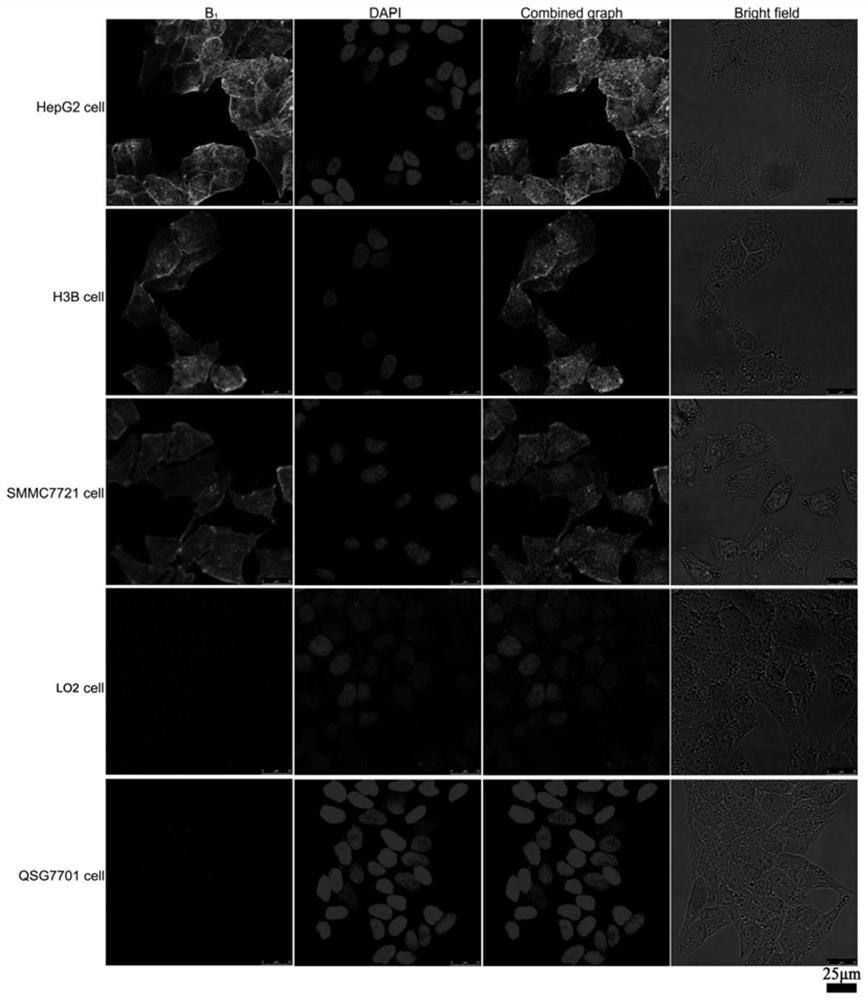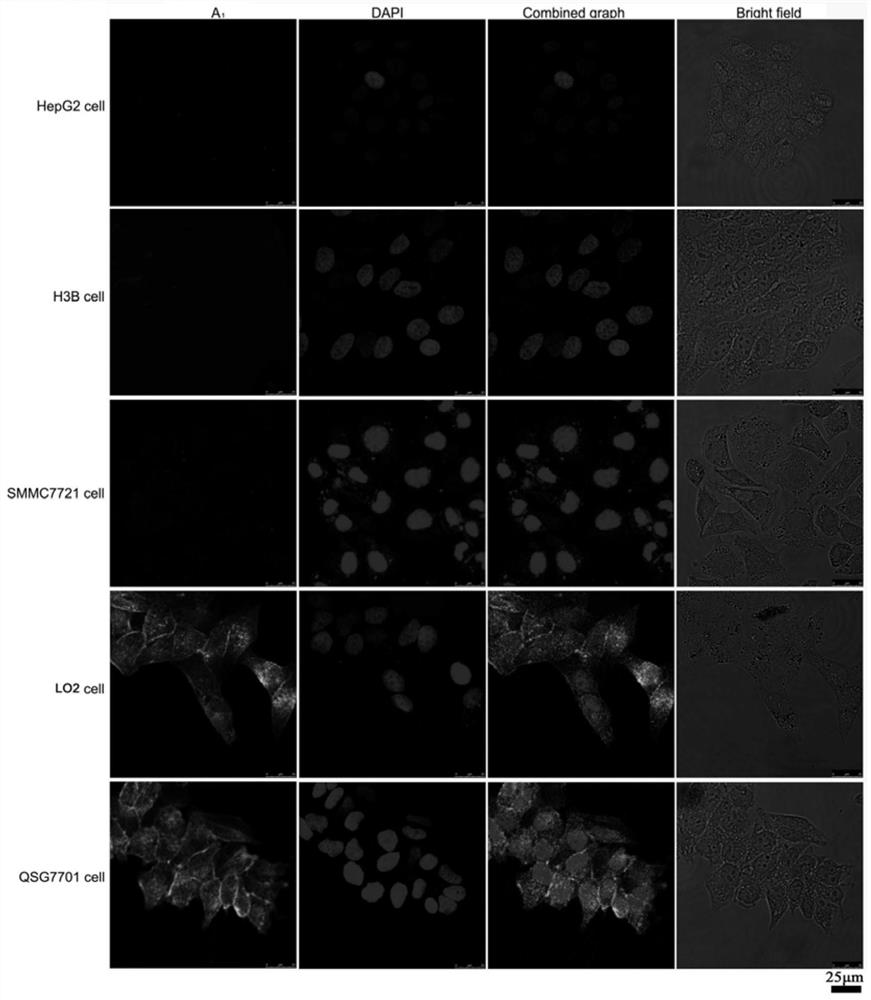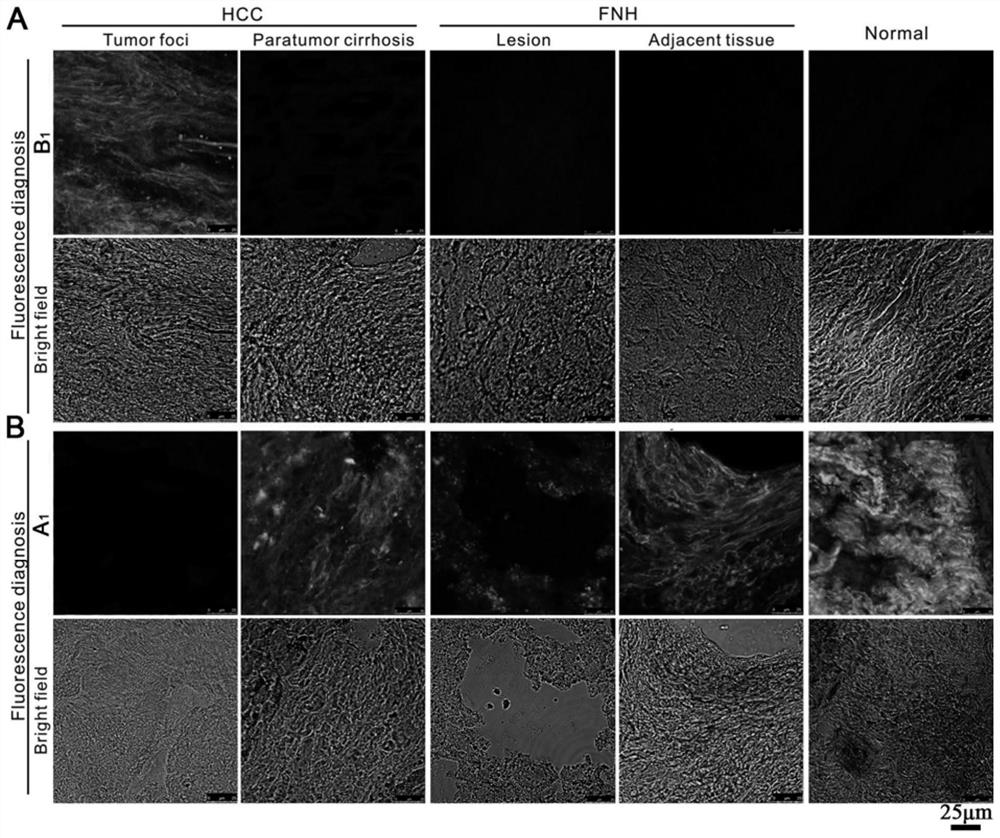Fluorescent compound and its preparation method, and its application in cross-validation localization of liver tumor lesion tissue
A fluorescent compound and liver tumor technology, applied in the field of biosensing and imaging, can solve the problems of difficult tumor diagnosis and treatment, and achieve the effect of short time-consuming, convenient operation, fast and accurate identification
- Summary
- Abstract
- Description
- Claims
- Application Information
AI Technical Summary
Problems solved by technology
Method used
Image
Examples
preparation example Construction
[0056] The present invention also provides a method for preparing the above fluorescent compound, comprising the following steps:
[0057] (a) 4-formylbenzeneboronic acid and diphenylacetylene are heated and reacted under protective atmosphere under the action of palladium acetate and silver carbonate to obtain an intermediate;
[0058] (b) The intermediate is reacted with alkyl 2-cyanoacetate under the action of an organic base.
[0059] In actual operation, in step (a), the temperature of the heating reaction is 90-120° C., and the time of heating reaction is 0.5-2 h; in step (a), the molar ratio of 4-formylbenzeneboronic acid and diphenylacetylene is 1:(0.8~1.2), preferably 1:1.
[0060] In a specific embodiment of the present invention, step (a) further includes a solvent, and the solvent includes n-propanol and water.
[0061] In a specific embodiment of the present invention, in step (a), after the heating reaction, post-processing is also included; the post-processing...
Embodiment 1
[0104] This example provides fluorescent compound A 1 , and its structure is as follows:
[0105]
[0106] The fluorescent compound A 1 The preparation method comprises the following steps:
[0107] (1) 2.00 mmol of 4-formylphenylboronic acid, 2.00 mmol of diphenylacetylene, 0.05 mmol of palladium acetate, 2.00 mmol of silver carbonate and 5 mL of a mixed solvent of n-propanol and water (v / v=9:1) were added to 25 mL Into the three-necked flask, nitrogen was introduced, and the three-necked flask was reacted at 95 °C for 120 min under stirring, and the suspension in the three-necked flask was added to a centrifuge tube for 15 min. Wash with methyl chloride, combine the supernatant liquid and washing liquid after removing the catalyst, centrifuge again, and filter under reduced pressure to obtain a clear solution. An appropriate amount of anhydrous sodium sulfate was added to the obtained clear solution, shaken and stood for 10 minutes to remove water, and the sodium sulfa...
Embodiment 2
[0117] The fluorescent probe composition provided in this example includes fluorescent compound A 1 and fluorescent compound B 1 .
[0118] The method for cross-checking and localizing liver tumor lesions using the fluorescent probe composition includes the following steps:
[0119] (1) Fluorescent Compound A 1 Dissolved in DMSO to prepare fluorescent compound A 1 The concentration is 1 x 10 -2 mol / L of solution I 1 ; Dilute solution 1 with high glucose DMEM medium 1 Formulated as Fluorescent Compound A 1 The concentration is 1 x 10 -5 mol / L of solution I 2 . Fluorescent Compound B 1 Dissolved in DMSO to prepare fluorescent compound B 1 The concentration is 1 x 10 -2 mol / L solution II 1 ; Dilute solution II with high glucose DMEM medium 1 Formulated as Fluorescent Compound B 1 The concentration is 1 x 10 -5 mol / L solution II 2 .
[0120] (2) Inactivate human liver tumor cell lines (HepG2 cell, Hep3B cell, SMMC7721 cell) and human normal liver cell lines (LO2 ...
PUM
| Property | Measurement | Unit |
|---|---|---|
| diameter | aaaaa | aaaaa |
Abstract
Description
Claims
Application Information
 Login to View More
Login to View More - R&D
- Intellectual Property
- Life Sciences
- Materials
- Tech Scout
- Unparalleled Data Quality
- Higher Quality Content
- 60% Fewer Hallucinations
Browse by: Latest US Patents, China's latest patents, Technical Efficacy Thesaurus, Application Domain, Technology Topic, Popular Technical Reports.
© 2025 PatSnap. All rights reserved.Legal|Privacy policy|Modern Slavery Act Transparency Statement|Sitemap|About US| Contact US: help@patsnap.com



